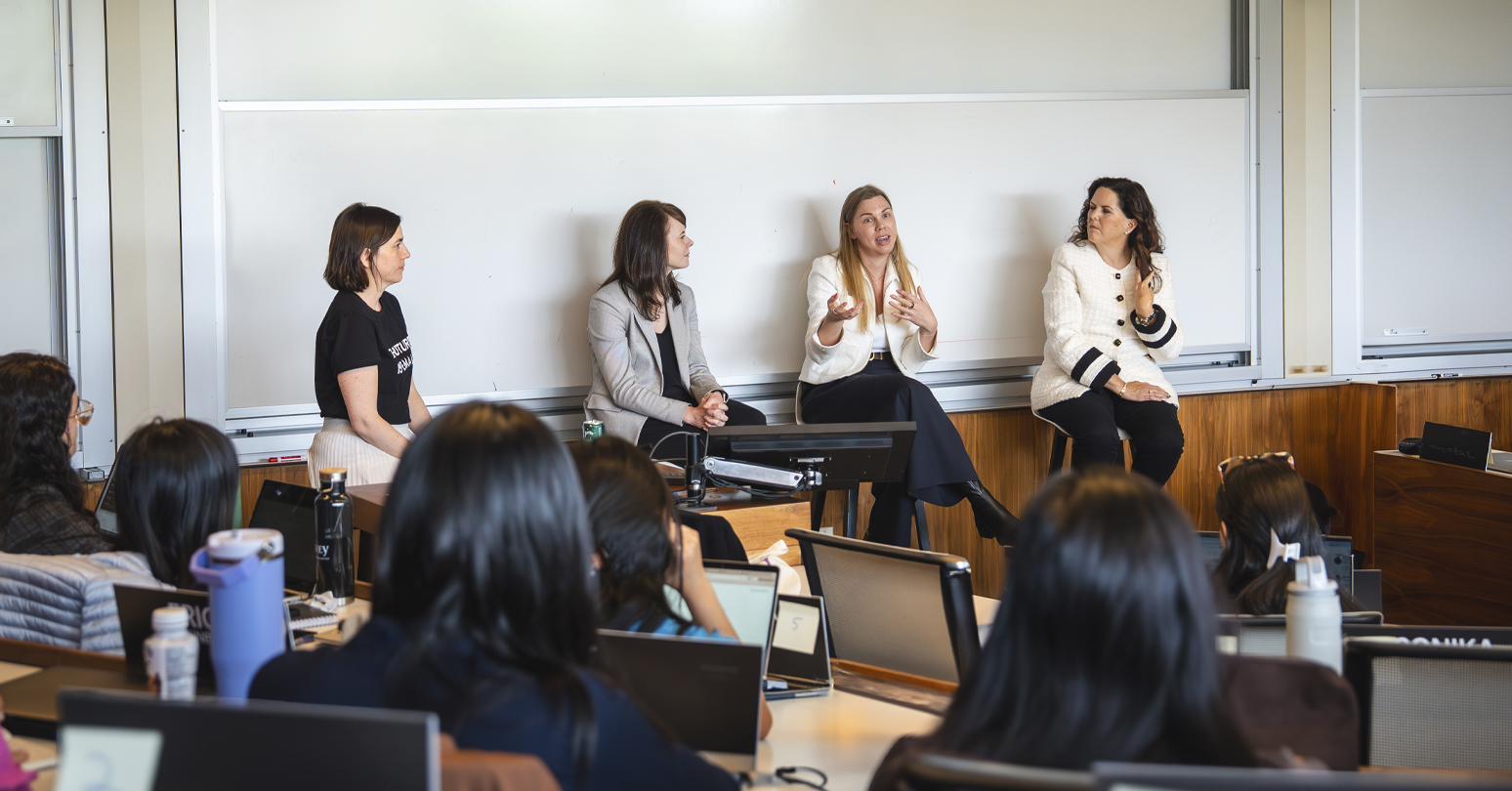As Ivey’s Women in Asset Management (WAM) program entered its final phase of in-class learning, students gained an inspiring glimpse into their future careers through candid insights and personal stories from three trailblazing women in finance. WAM is a month-long intensive program at Ivey designed for second-year undergraduate students from universities across Canada who self-identify as women. The program offers academic training, industry exposure, and mentorship to prepare participants for summer internships in asset management.
This year, participants heard from Melanie Adams, J.D. (Managing Director & Head of Responsible Investment, RBC Global Asset Management), Kristi Pahapill (Vice President, Strategic Initiatives, Renewable Energy and Transition, Brookfield Asset Management), and Jennifer Stevenson (Vice President & Portfolio Manager, Scotia Global Asset Management, Energy). With diverse backgrounds in science, law, marketing, and commerce, the speakers offered reflections on responsible investing, the importance of taking risks, and what it means to build a career as a woman in a male-dominated industry.
Being a leader in the era of ESG
Moderated by Ivey associate professor Diane-Laure Arjaliès, founder of Ivey’s Sustainable Finance Lab, the panel began with a timely discussion on environmental, social, and governance (ESG) strategy and responding to the global political landscape.
Stevenson, who manages funds in the energy sector, spoke about shifting views on ESG.
“I think the backlash we’re seeing is an anti-unprofitable movement,” she said.
While ESG investing was initially met with excitement, Stevenson said views on the industry changed when returns didn’t meet investors’ expectations.
“It was all great and then the music stopped, and I think that translated into negative sentiment about anything green – whether it's ESG or renewable energy,” she said.
While Stevenson highlighted profit-based criticisms, she acknowledged that there are still many thriving companies doing great work in the renewable sector.
“I think the framing of ESG has just become too negative,” she said.
Drawing on her experience at RBC GAM, Adams emphasized the importance of firms approaching ESG with authenticity.
“Our view is always that we make decisions for risk-return reasons, and [we do so] because we care about these factors, not because we want to market something," she said.
Pahapill summed up the consensus among the three experts, emphasizing the relevance of ESG to young professionals entering the industry.
“The fundamentals of ESG still matter a lot,” she said. “If anything, they probably matter more now than they ever have.”
Navigating finance as a woman
Having built her career in Alberta’s oil and gas industry, Stevenson recalled often being “one of two girls in the room,” but noted a positive shift over time.
“You can be viewed as a sector expert as a woman – that's changed over 30 years,” she said.
Pahapill emphasized the importance of reliable mentorship in helping women build confidence and advance in asset management.
“Having people that you can bounce ideas off gives you courage to have a voice in a room,” she said.
The Brookfield executive also encouraged students to consistently reflect on their personal goals and stay aligned with their aspirations.
“It’s your own career – it’s really on you to think about whether something’s working for the skills that you’re looking to develop,” she said.
All three leaders praised the WAM program, expressing that they wished similar learning and networking opportunities had been available to them as they navigated their early careers.
Taking risks in your early career
The panelists urged the students to embrace uncertainty and non-linear paths.
“Careers zigzag,” said Pahapill. “The role you take now doesn’t define your whole career.”
Adams agreed, highlighting her switch from law to finance as an example.
“If I had worried about mapping my career 15 years into the future, I wouldn't be in my current role, which I love,” she said. “You have to look at what you like doing and what you are going to do every day – because that's what is important. If you like it, then you're building up all your parachutes and no decision is earth-shattering because you have this entire toolbox you can rely on for your plan B.”
Stevenson highlighted the importance of open-mindedness as students discover their niche.
“If you’re going into any department of any business or investment side, you’re going to learn,” she said. “Something might seem boring now, or it might be the next sexy thing.”
Words of wisdom
To wrap up, the panelists offered advice to the young women preparing to enter the field through their upcoming summer internships in asset management.
“Just milk it. It'll be awesome,” said Stevenson, referring to how every role prepares you for the next. “Be confident. You can be wrong and say you're wrong or that you don't know the answer, and that's totally OK – that's how you learn.”
Pahapill emphasized the importance of building relationships while navigating new environments.
“It's a relationship business – it doesn't matter what part of the market you work in. Everyone wants to work with people they trust, and you build trust by communication – spending time with people, going out for those drinks – even if you're not drinking, just go. Find a way to become comfortable with people that you're uncomfortable having conversations with.”
Capturing her passion for the field, Adams offered a playful piece of advice to the students.
“If you want a job that is boring, go somewhere else. Every week it’s something new, and it’s exciting,” she said.
With optimism and encouragement, the panel delivered a powerful message to the WAM class of 2025: the future of asset management is a space for women to lead, learn, and thrive.



